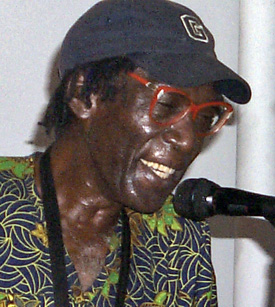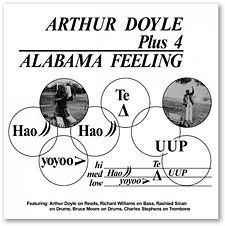Arthur Doyle
Arthur Roy Doyle (born June 26, 1944 in Birmingham) is a free-jazz-soul saxophonist, vocalist and composer.
Doyle was the second of five children born to Arthur Lee and Margaret Doyle. He was assigned the French horn in the school band. Inspired by seeing Duke Ellington and Louis Armstrong on television, he listened to as many jazz recordings as he could find. He spent days at Thereline's hair salon poring through her collection of records and became most interested in the saxophone. His parents bought him an alto sax when he was twelve. As he got older he heard John Coltrane on Miles Davis' "Kind of Blue" and "Milestones" and his brother, Carserlo introduced him to Sonny Rollins' music. As a teenager he learned to play jazz from Otto Ford and later performed with him and Walter Miller at the Four D Jones club.
Doyle attended Tennessee State University and played with Louis Smith and T. J. Anderson in Nashville. He joined Aaron Neal's big band which played bop and pushed slightly into free jazz. He and Neal moved to Detroit, Michigan for a while, playing in Charles Moore's big band, but soon returned to Tennessee and toured with the Nashville rhythm and blues group Johnny Jones & the King Casuals. In 1967 he left the band on a Summer tour in Boston and headed for New York City.
In New York, Doyle's music progressed from straight bop to free jazz. He hooked up with drummer Milford Graves who was involved in what was termed the "New Black Music", and was rooted in the Harlem community. Doyle sat in on several performances with Pharoah Sanders and Sun Ra's Arkestra. Surprised by hearing his voice come through the horn while he played with a soft reed, Doyle began experimenting with what he dubbed the "voice-a-phone". He played regularly as a member of Noah Howard's combo.
Their "The Black Ark" record of 1969 would be Doyle's only recording until 1976, when he surfaced with Graves' and Hugh Glover in the Babi Music combo. Through the early 1970s, Doyle was heavily involved in the emerging "loft scene" of alternative jazz. He suffered a nervous breakdown and retreated from performing until about 1975, earning a living as a teacher and welfare caseworker.
In 1977 Doyle started up his own quintet for a recording session at Charles Tyler's "The Brook" loft on West 17th Street. The group included fellow Birminghamians Charles Stephens and Rashied Sinan, along with Bruce Moore and Richard Williams. The quintet recorded a seminal album of early free jazz entitled "Alabama Feeling". He became an important figure in the hard-edged free jazz of the period, sometimes called the "No Wave" movement. He joined guitarist Rudolph Grey and drummer Beaver Harris in a group called the Blue Humans, which played landmark shows at Hurrah and Tier 3. Doyle left the group and made a successful visit to Paris in 1980 before moving back to Alabama.
After two years, Doyle returned to Paris, but was arrested shortly after his arrival and served five years (1983–1988) in prison. His conviction was overturned after his release. Without an instrument, he turned to vocal improvisation and writing. He put down the first 150 or so of the 300 compositions that would make up his massive songbook. After his release he moved to Endicott, New York, to live with his brother, an IBM employee. He soon began teaching in the area and moved to his own apartment nearby. He recorded many of his compositions there on a small tape recorder, adding flute and tenor sax to his repertoire of shouts, riffs and utterings. Three 1990s album releases drew from those sessions.
Doyle reunited his former quintet a couple of times for performances at SUNY, and backed up Sonny Rollins in one such performance. Championed by Grey and Sonic Youth frontman Thurston Moore, he returned to New York City for a 1992 bill with Grey at CBGB's. Over the next several years Doyle sat in with numerous jazz and improv players through the 1990s, including Wilber Morris, Rashid Bakr, Sunny Murray, and Keiji Haino. He began using his vocalizations more in concert and toured Japan to great acclaim. He also played in a few recording sessions with other groups. Doyle returned to Birmingham around 2000 to help care for his parents. He was a special guest for the "Abalabip!" kickoff concert for the Year of Alabama Music held at the Alabama Theatre on February 5, 2011.
Discography
- Arthur Doyle Trio Nature Boy. Homeboy Music
- Arthur Doyle (1978) Alabama Feeling. Ak-Ba Records (reissued 1995 by DRA and 2009 by Rank Records)
- Arthur Doyle (1993) More Alabama Feeling. Forced Exposure magazine
- Arthur Doyle (1995) The Songwriter. Ecstatic Peace! Records
- Arthur Doyle (1995) Plays and Sings from the Songbook Vol. I. Audible Hiss Records
- The Blue Humans (1995) Live NY 1980. Audible Hiss Records
- Arthur Doyle Quartet (1996) Live at the Cooler with Rudolph Grey & Tom Surgal. The Lotus Sound
- Arthur Doyle (1997) Do the Breakdown. An Soph Records
- Arthur Doyle (2000) A Prayer for Peace. Zugswang Records
- Arthur Doyle & Sunny Murray (2000) Dawn of a New Vibration. Fractal Records
- Arthur Doyle Electro-Acoustic Ensemble (2001) Plays the African Love Call. Ecstatic YOD Records
- Arthur Doyle & Sunny Murray (2001) Live at the Glenn Miller Cafe. Ayler Records
- Arthur Doyle (2002) Live at the Dorsch Gallery. Carbon Records
- Arthur Doyle Electro-Acoustic Ensemble (2002) Conspiracy Nation. Qbico Records
- Arthur Doyle, Takashi Mizutani & Sabu Toyozumi (2003) Live in Japan 1997. Qbico Records
- Arthur Doyle, Takashi Mizutani & Sabu Toyozumi (2003) The Basement Tapes. Durto Records
- Arthur Doyle & Hamid Drake (2004) Your Spirit is Calling. Qbico Records
- Arthur Doyle (2005) No More Crazy Women. Qbico Records
- Arthur Doyle (2005) No More Evil Women Tour. Carbon Records
- Arthur Doyle Electro-Acoustic Ensemble (2005) Patriotic Act. Qbico Records
- Arthur Doyle ( ) Bushman Yoga. Ruby Red Records
References
- Cross, Dave (June 2000) "Arthur Doyle - Me, Myself". Perfect Sound Forever
- "Arthur Doyle" interview at Homeboy Music
External links
- Arthur Doyle at AllMusic.com

